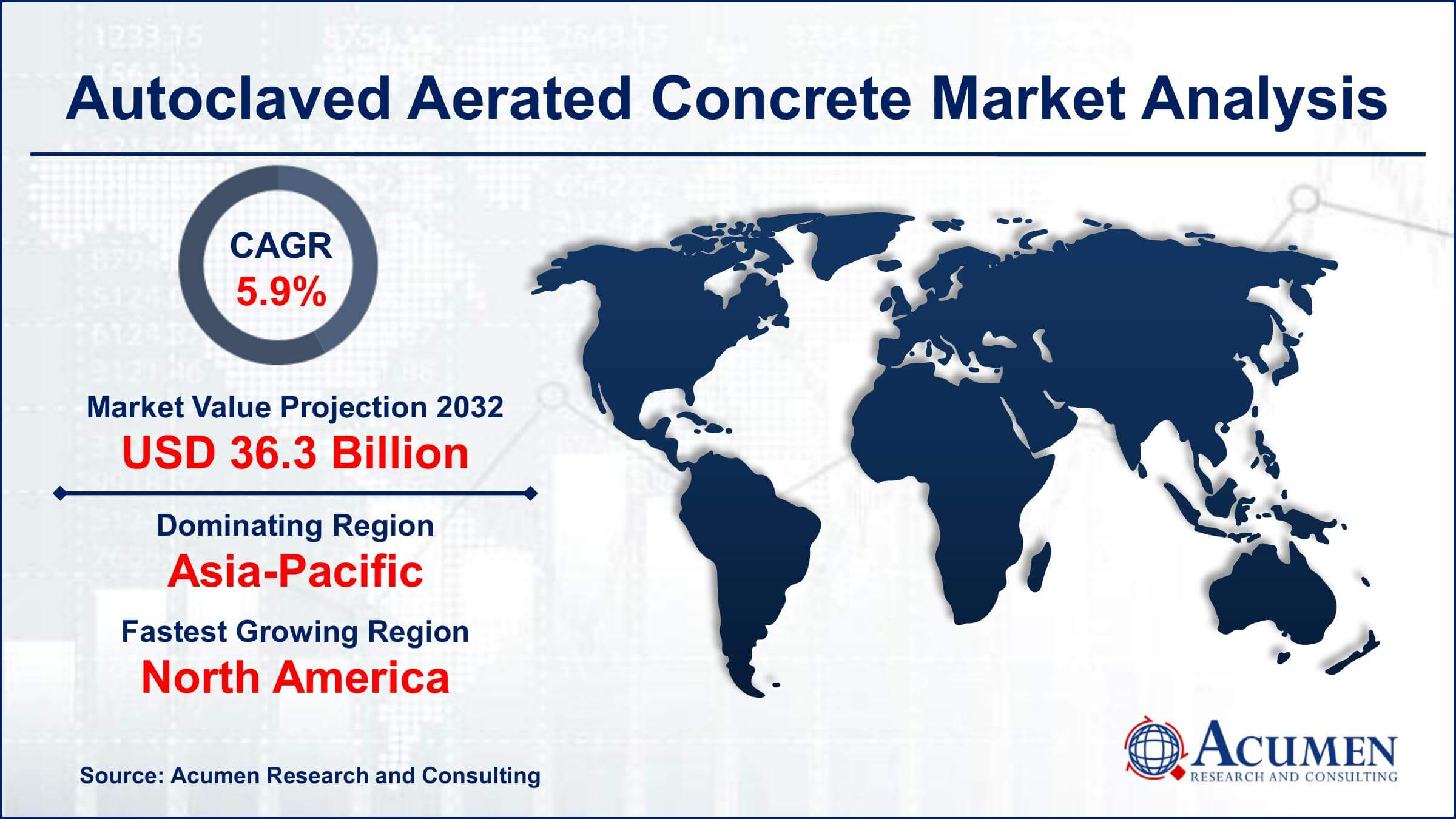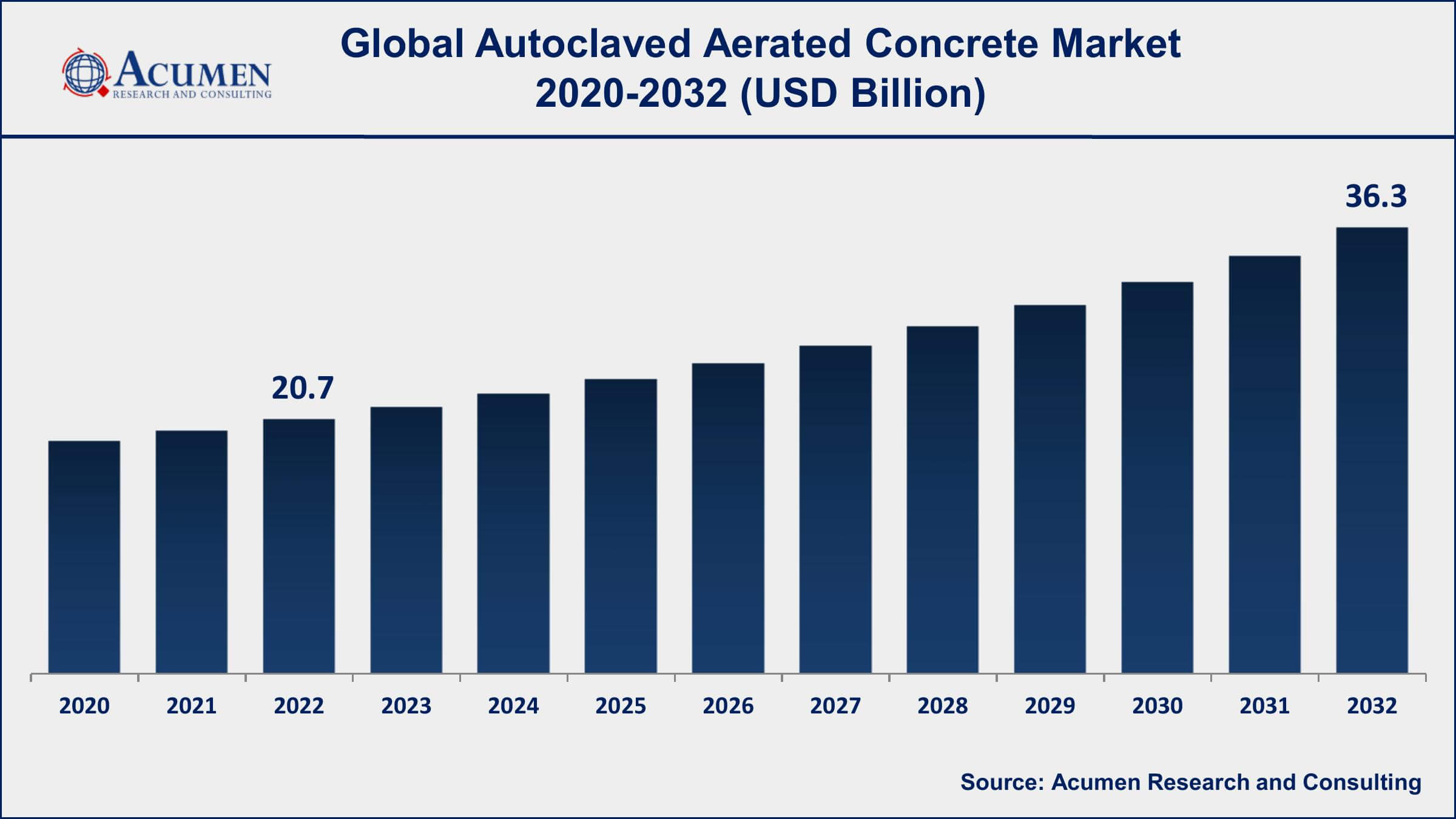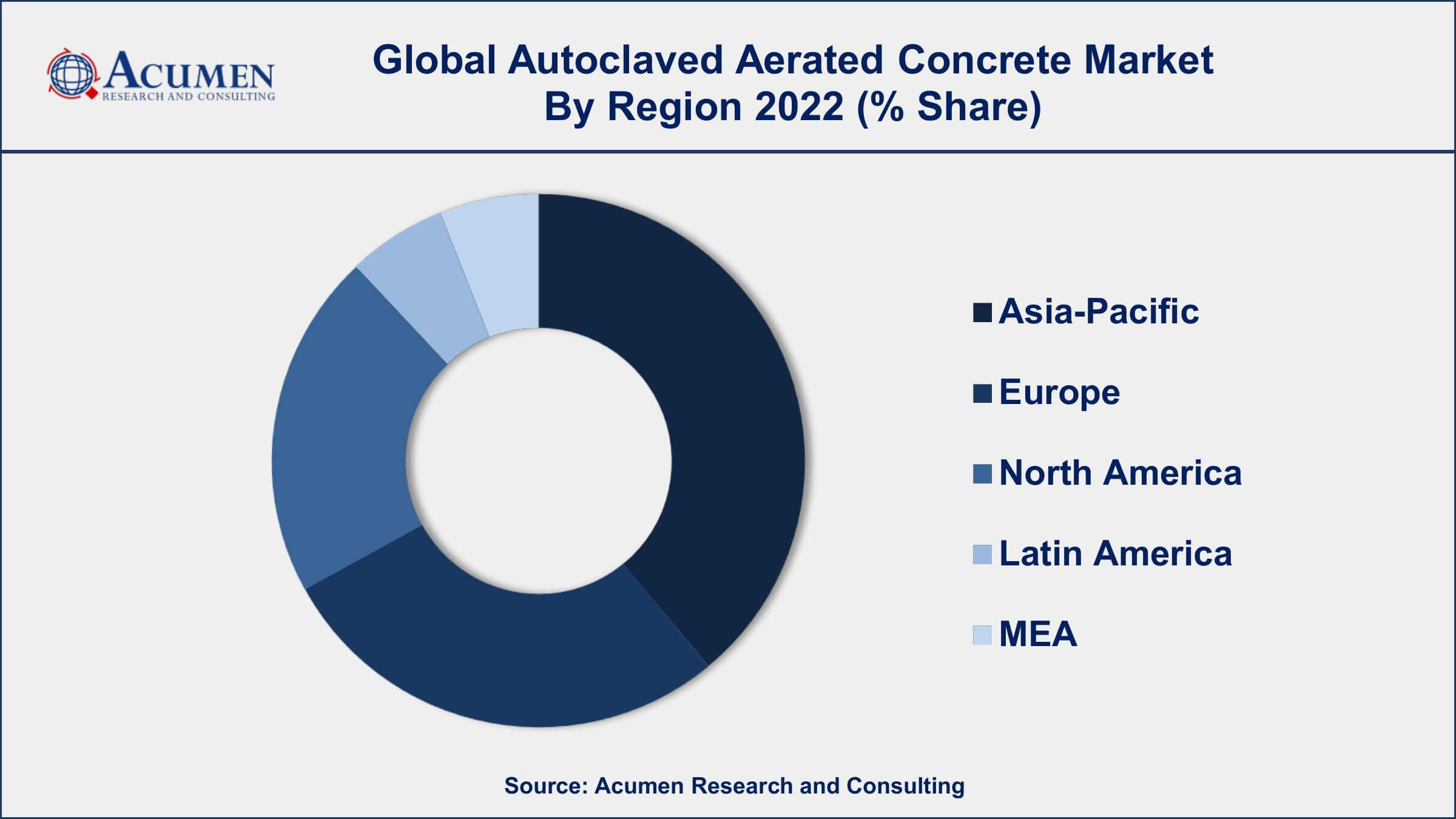Autoclaved Aerated Concrete Market Size - Global Industry, Share, Analysis, Trends and Forecast 2023 - 2032
Published :
Report ID:
Pages :
Format :
Autoclaved Aerated Concrete Market Size - Global Industry, Share, Analysis, Trends and Forecast 2023 - 2032
Report Coverage
- Industry Dynamics
- Market Size and Forecast Data
- Segment Analysis
- Competitive Landscape
- Regional Analysis with a Niche Focus on Country-Level Data
- High Level Analysis - Porter's, PESTEL, Value Chain, etc.
- Company Profiles of Key Players
- Option to Customize the Report As Per Your Specific Need
Request Sample Report
The Global Autoclaved Aerated Concrete (AAC) Market Size accounted for USD 20.7 Billion in 2022 and is projected to achieve a market size of USD 36.3 Billion by 2032 growing at a CAGR of 5.9% from 2023 to 2032.
Autoclaved Aerated Concrete Market Highlights
- Global autoclaved aerated concrete market revenue is expected to increase by USD 36.3 Billion by 2032, with a 5.9% CAGR from 2023 to 2032
- Asia-Pacific region led with more than 40% of autoclaved aerated concrete (AAC) market share in 2022
- North America autoclaved aerated concrete market growth will record a CAGR of over 7% from 2023 to 2032
- Among types, the block sub-segment generated around 38% share in 2022
- The residential sector is the largest end-use segment for AAC, accounting for over 50% of the global market share
- Increasing demand for eco-friendly and sustainable construction materials, drives the autoclaved aerated concrete market value

Autoclaved Aerated Concrete (AAC) is a lightweight, precast, foam concrete building material that contains air bubbles throughout its structure, giving it a low density and excellent thermal insulation properties. It is produced by mixing cement, lime, water, and a small amount of aluminum powder, which reacts with the other ingredients to produce hydrogen gas, resulting in the formation of air bubbles in the mix. This mixture is then poured into a mold and cured under high-pressure steam, which causes it to harden and set, creating a solid, durable, and versatile building material.
The global market for AAC has been growing rapidly in recent years due to the increasing demand for sustainable and eco-friendly construction materials. AAC has many advantages over traditional building materials, including high fire resistance, excellent thermal insulation, and sound insulation, and it is also lightweight and easy to handle and install. The construction industry has been embracing the use of AAC for its energy efficiency, durability, and cost-effectiveness, which has led to an increase in demand for AAC products globally. The market growth of AAC is expected to continue in the coming years due to the increasing demand for sustainable and eco-friendly construction materials. The use of AAC is becoming more prevalent in residential, commercial, and industrial construction projects due to its numerous benefits. Additionally, the growing population and urbanization in developing countries are expected to drive demand for affordable and sustainable housing, which is likely to further boost the AAC market growth.

Global Autoclaved Aerated Concrete Market Trends
Market Drivers
- Increasing demand for eco-friendly and sustainable construction materials
- Growing focus on energy-efficient buildings
- Lightweight and easy to handle and install
- Growing construction industry in developing countries
- Increasing demand for affordable and low-cost housing
Market Restraints
- High initial investment costs for AAC production
- Limited availability of raw materials in certain regions
Market Opportunities
- Increasing use of AAC in pre-fabricated construction projects
- Rising popularity of green buildings and sustainable architecture
Autoclaved Aerated Concrete Market Report Coverage
| Market | Autoclaved Aerated Concrete Market |
| Autoclaved Aerated Concrete Market Size 2022 | USD 20.7 Billion |
| Autoclaved Aerated Concrete Market Forecast 2032 | USD 36.3 Billion |
| Autoclaved Aerated Concrete Market CAGR During 2023 - 2032 | 5.9% |
| Autoclaved Aerated Concrete Market Analysis Period | 2020 - 2032 |
| Autoclaved Aerated Concrete Market Base Year | 2022 |
| Autoclaved Aerated Concrete Market Forecast Data | 2023 - 2032 |
| Segments Covered | By Type, By Application, And By Geography |
| Regional Scope | North America, Europe, Asia Pacific, Latin America, and Middle East & Africa |
| Key Companies Profiled | Xella Group, CSR Hebel, Aercon AAC, H+H International A/S, UltraTech Cement Ltd., ACICO Industries Co. KSCC, Biltech Building Elements Limited, AKG Gazbeton, Wehrhahn GmbH, Bauroc International AS, Schlamann KG, and Eco Green Co. Ltd. |
| Report Coverage |
Market Trends, Drivers, Restraints, Competitive Analysis, Player Profiling, Covid-19 Analysis, Regulation Analysis |
Autoclaved cellular concrete (ACC) is a type of lightweight concrete that is similar to autoclaved aerated concrete (AAC). It is also known as autoclaved cellular concrete or aerated concrete. Like AAC, ACC is made from natural materials such as cement, lime, sand, and water, and is produced using a similar process. The main difference between AAC and ACC is the type of expanding agent used. While AAC is made using aluminum powder or sodium aluminum sulfate, ACC is made using a foaming agent, such as protein-based compounds or surfactants. This results in a material that has a finer texture than AAC and is even lighter in weight. ACC is also known for its excellent thermal insulation properties, fire resistance, and durability. It is used in a wide range of applications, including wall panels, roof panels, blocks, and lintels. Like AAC, ACC is ideal for constructing energy-efficient buildings and is an environmentally friendly building material.
Inclination towards green and soundproof buildings coupled with cost-effective & light material-weight building solutions are the factors penetrating the growth of this market. The rising emphasis on constructing building structures to withstand an earthquake or any natural calamity together with the mounting adoption of ACC products over conventional clay bricks is driving the market growth swiftly. However, ACC manufacturing unit setup involves high installation costs and therefore restrains the market expansion among existing & new entrants in this market. Rising standards of living and increasing spending power among the population have allowed builders to collaborate with earthquake engineering which is simultaneously boosting the growth of the global autoclaved aerated concrete (AAC) market.
Autoclaved Aerated Concrete Market Segmentation
The global autoclaved aerated concrete market segmentation is based on type, application, and geography.
Autoclaved Aerated Concrete Market By Type
- Block
- Panel
- Lintel
- Tile
- Others
In terms of types, the block segment has seen significant growth in the autoclaved aerated concrete market in recent years. AAC blocks are a popular building material due to their lightweight and easy-to-handle properties, as well as their superior thermal and acoustic insulation properties. The growth of the block segment in the AAC market is primarily driven by the increasing demand for sustainable and eco-friendly construction materials. AAC blocks are made from natural materials, which makes them an eco-friendly alternative to traditional building materials like concrete and brick. Additionally, AAC blocks have low density, which makes them easy to handle and install, reducing labor costs and construction time. The block segment in the AAC market is also benefiting from the growing construction industry in developing countries. As urbanization and population growth continue to increase, the demand for affordable housing is rising, and AAC blocks are becoming a popular choice for building affordable and sustainable homes.
Autoclaved Aerated Concrete Market By Application
- Residential
- Commercial
- Industrial
- Others
According to the autoclaved aerated concrete market forecast, the residential segment is expected to witness significant growth in the coming years. AAC is becoming increasingly popular as a building material in the residential construction sector due to its numerous benefits, including its lightweight, superior thermal and acoustic insulation, fire resistance, and durability. The growth of the residential segment in the AAC market is primarily driven by the increasing demand for sustainable and eco-friendly building materials. AAC is made from natural materials and does not release any toxic fumes or substances, making it an environmentally friendly alternative to traditional building materials such as concrete and brick. Additionally, AAC has superior insulation properties, which makes it an ideal material for constructing energy-efficient homes that can reduce energy consumption and costs. The residential segment in the AAC market is also benefiting from the increasing demand for affordable and low-cost housing..
Autoclaved Aerated Concrete Market Regional Outlook
North America
- U.S.
- Canada
Europe
- U.K.
- Germany
- France
- Spain
- Rest of Europe
Asia-Pacific
- India
- Japan
- China
- Australia
- South Korea
- Rest of Asia-Pacific
Latin America
- Brazil
- Mexico
- Rest of Latin America
The Middle East & Africa
- South Africa
- GCC Countries
- Rest of the Middle East & Africa (ME&A)

Autoclaved Aerated Concrete Market Regional Analysis
The Asia-Pacific region is currently dominating the autoclaved aerated concrete (AAC) market and is expected to continue to hold a significant market share in the coming years. The growth of the AAC market in the Asia-Pacific region is primarily driven by rapid urbanization and industrialization in countries such as China, India, and Indonesia. These countries have a large population base and are experiencing a surge in construction activities, including residential and commercial construction, infrastructure development, and industrial construction. Additionally, the increasing focus on sustainable and eco-friendly construction materials in the Asia-Pacific region is driving the demand for AAC. AAC is an environmentally friendly building material that is made from natural materials and has a lower carbon footprint than traditional building materials. The superior insulation properties of AAC also make it an ideal material for constructing energy-efficient buildings, which is becoming increasingly important in the Asia-Pacific region due to rising energy costs and increasing environmental concerns.
Autoclaved Aerated Concrete Market Player
Some of the top autoclaved aerated concrete market companies offered in the professional report include Xella Group, CSR Hebel, Aercon AAC, H+H International A/S, UltraTech Cement Ltd., ACICO Industries Co. KSCC, Biltech Building Elements Limited, AKG Gazbeton, Wehrhahn GmbH, Bauroc International AS, Schlamann KG, and Eco Green Co. Ltd.
Frequently Asked Questions
What was the market size of the global autoclaved aerated concrete in 2022?
The market size of autoclaved aerated concrete was USD 20.7 Billion in 2022.
What is the CAGR of the global autoclaved aerated concrete market from 2023 to 2032?
The CAGR of autoclaved aerated concrete is 5.9% during the analysis period of 2023 to 2032.
Which are the key players in the autoclaved aerated concrete market?
The key players operating in the global market are including Xella Group, CSR Hebel, Aercon AAC, H+H International A/S, UltraTech Cement Ltd., ACICO Industries Co. KSCC, Biltech Building Elements Limited, AKG Gazbeton, Wehrhahn GmbH, Bauroc International AS, Schlamann KG, and Eco Green Co. Ltd.
Which region dominated the global autoclaved aerated concrete market share?
Asia-Pacific held the dominating position in autoclaved aerated concrete industry during the analysis period of 2023 to 2032.
Which region registered fastest CAGR from 2023 to 2032?
North America region exhibited fastest growing CAGR for market of autoclaved aerated concrete during the analysis period of 2023 to 2032.
What are the current trends and dynamics in the global autoclaved aerated concrete industry?
The current trends and dynamics in the autoclaved aerated concrete industry include increasing demand for eco-friendly and sustainable construction materials, growing focus on energy-efficient buildings, and lightweight and easy to handle and install.
Which type held the maximum share in 2022?
The block type held the maximum share of the autoclaved aerated concrete industry.



